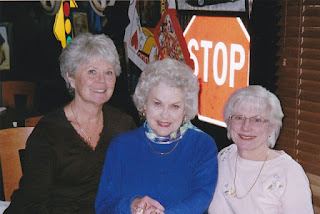But what if you don't have someone else's carefully researched family history of 60 or 70 years ago? The adage in family history work is "start with what you know." Then you go looking for distant relatives, and hope there are some very old ones who are willing to talk to you. Aside from the fact that this can be fun, you need a context for information you find online. Almost every name in a census has a duplicate, and a lot of them live in the same state. In my extended family there have been enough William Orrs to start a baseball team in the great beyond.
In the case of my mom's father's family, which had almost nothing written, my cousin Peg Pierson started the work and lucked out. Not luck, really. She searched hard for Rooney/Roney families in Kansas, Missouri, and Indiana. She came up with two long-lived women, and in fact just attended the 100th birthday party of one of them (Alexis McCormick), and together we visited another, Eugenia Chandonia, who is 92. I can say her age because she will brag about it to anyone.
But it wasn't just the good fortune in finding these two women. These are women who listened to the stories of those around them and were willing to share. In Eugenia's case, her mother (Inez Roney Groff) had collected photos and names, and Eugenia continued the tradition.
 |
| Peg Pierson, Eugenia Chandonia, and Elaine Orr - Rooney/Roney cousins. |
I hope you can find the Lexis and Eugenias of your family and spend time with them. Don't wait. You don't have to be as nutty as cousin Peg and I, who record and publish the histories (though future generations would be happy if you did). Just ask and listen, and then share the stories with your children and cousins.